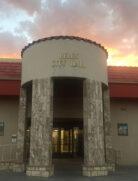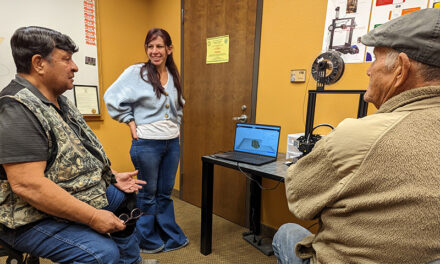BELEN — The city of Belen has a new tool that is designed to help entice new businesses to the Hub City.
By unanimous vote last week, city councilors adopted a new ordinance, Gross Receipts Investment Policy, which establishes a procedure for financing, through the refund of gross receipts taxes, the development and construction of infrastructure.

“We can help offset costs for companies looking at coming into Belen,” Tomita told the council. “While the LEDA program focuses on very large industrial plants and warehousing, it prohibits participation with retail, except under two circumstances.”
Tomita said GRIP is allowed to help retail businesses if the population stays under 10,000 people.
“It’s focused on large commercial centers or entertainment centers, but also allows us to assist smaller retail that can’t afford to do public improvements,” Tomita said.
With the new ordinance, the city may repay a developer for the cost of public infrastructure related to the development. The city could also reimburse impact fees where the reimbursement is instrumental in bringing the business to Belen.
“The GRIP allows us to use the gross receipts tax that is collected from that business … and if they (the business) have to do public improvements such as curb and gutters, extending utilities, putting in medians, and that becomes too excessive of a cost, the city can reimburse up to 50 percent back of the gross receipts collected,” Tomita said.
According to the new ordinance, the city is authorized to enter into a GRIP agreement for any one or more of the following:
- The acquisition, construction, rehabilitation, construction of additions or making of any improvements to public parking lots.
- The acquisition, extension, enlargement, repair or other improvement of or maintenance of storm sewers and other drainage improvements, sanitary sewers, sewage treatment plants or other water utility infrastructure, including but not limited to the acquisition of rights of way and water rights, or any combination of the foregoing.
- The purchase, acquisition, or rehabilitation of fire-fighting equipment or any combination of the foregoing.
- The reconstruction, extension, resurface, maintenance, repair or otherwise improvement of existing alleys, streets, roads or any combination of the foregoing, or for the construction of acquisition of new alleys, streets, roads or any combination thereof, inclusive of acquisition of any rights or way and public transportation transfer facilities.
- The purchase, acquisition or clearing of any land, or the purchase or acquisition of beautification of land for open space.
- The acquisition, construction, equipping, furnishing, making additions to, renovating, rehabilitating, beautifying or otherwise improving public parks, public recreational facilities or any combination thereof.
- The refund of impact fees which provides a specific incentive for location of the retail business in the city.
- The acquisition or construction of any other related public infrastructure that enhances and encourages the location of new retail business within the city.
Tomita said the GRIP funding could have helped Love’s when the New Mexico Department of Transportation was telling them they would have to pay for the reconstruction of new on and off ramps to Interstate 25.
“Thankfully, they didn’t have to do that and DOT didn’t have the basis to demand that of Love’s,” Tomita said. “But dealing with DOT and different public improvements we have to do over time, expansion of utilities, I’m bringing the GRIP program back to the council for consideration of adoption.”
Tomita said before a GRIP project is funded, the city council will hold a public hearing and the business would be required to provide an estimated tax revenue. When and if the GRIP funds are approved, the city will pay the developer one half of the city’s share of total GRT attributed to the retail sales from that business.
“This is something we’re going to face more and more frequently since Main (Street) and Reinken (Avenue) will be involved in future development,” said Belen Mayor Robert Noblin.
In other business, the council:
- Approved the closure of Caldwell Avenue to and from the north side of Reinken Avenue as Allsup’s is planning on building a store at the Del Rio Plaza;
- Approved a memorandum of understanding with the Pueblo of Isleta for intergovernmental support regarding emergency responses;
- Approved the appointment of Maggie McDonald to the Belen Historic Properties Review Board;
- Approved the renewal of Library Board of Trustee members, Kathy Pickering, June Romero, Stephen Cohen, Holly Chavez and Frances Zeller;
- Approved the first of two 10-year land lease extensions with Lightening Bar A Hangars at Belen Regional Airport;
- Approved a one year lease of the old fire station at 116 Sixth Street for the Belen Area Food Pantry. The nonprofit organization, which provides food to 1,100 people a month, will operate out of the building, and will pay $600 a month in rent;
- Approved out-of-state travel for Belen Fire Marshal Kenneth Vance to attend the Alabama Fire School.
Clara Garcia is the editor and publisher of the Valencia County News-Bulletin.
She is a native of the city of Belen, beginning her journalism career at the News-Bulletin in 1998 as the crime and courts reporter. During her time at the paper, Clara has won numerous awards for her writing, photography and typography and design both from the National Newspaper Association and the New Mexico Press Association.

















